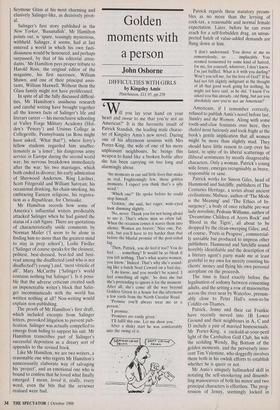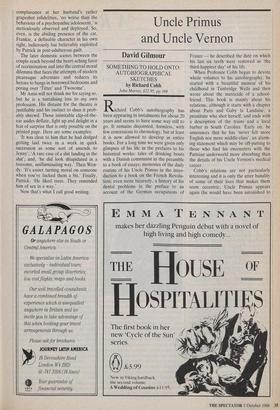Golden moments with a person
John Osborne
DIFFICULTIES WITH GIRLS by Kingsley Amis Hutchinson, £11.95, pp.256 Will you lay your hand on your heart and swear to me that you're not an American?' It is the favourite insult of Patrick Standish, the leading male charac- ter of Kingsley Amis's new novel. During one of his afternoon sessions with Mrs Porter-King, the wife of one of his more unpleasant neighbours, he brings this weapon to hand like a broken bottle after she has been carrying on too long and alarmingly about
'the moments in our sad little lives that make us real. Frighteningly few, those golden moments. I expect you think that's a silly word,' 'Which one?' He spoke before he could stop himself.
`Golden,' she said, her eager, wide-eyed look dimming slightly.
`No, never. Thank you for not being afraid to use it. That's where men so often fail. When the occasion comes it scares them into silence. Women are braver.' Nice one, Pat- rick, but you'll have to try harder than that before the blissful promise of the post-coital fag.
'Then, Patrick, you do feel it too? You do feel . . . something? It would be so bleak if you felt nothing. That's what scares women, you know.' Indeed. That's why she's sound- ing like a butch Noel Coward on a bad day.
'I do know, and you needn't be scared. I feel something all right.' So does she but she's pretending to ignore it for the moment. After all, she's come all the way beyond Golders Green to a house for-the-afternoon a few yards from the North Circular Road.
`Promise you'll always treat me as a person.'
'I promise.'
'Promises are easily given.'
'I'll fulfil this one. Let me show you.' After a shaky start he was comfortably into the swing of it.
Patrick regards these statutory pream- bles as no more than the levying of cock-tax, a reasonable and normal female expectation. Later, before he can even reach for a self-forbidden drag, an unsus- pected batch of value-added demands are flung down at him.
'I don't understand. You drove at me so remorselessly, so . . . implacably. You seemed tormented by some kind of hatred, for me, for yourself, whatever, I don't know, I'm just baffled. What is it with you darling? Won't you tell me, for the love of God?' If he had not felt slightly indignant at the thought of all that good work going for nothing, he might not have said, as he did, 'I know I've asked you this already, old thing, but are you absolutely sure you're not an American?'
Americans, if I remember correctly, refused to publish Amis's novel before last, Stanley and the Women. Along with some tooth-and-claw feminists over here, they chafed most furiously and took fright at the book's gentle implication that all women might be more than slightly mad. They should have little reason to carp over his latest, in spite of its liberal scatterings of illiberal sentiments by mostly disagreeable characters. Only a woman, Patrick's young wife Jenny, emerges recognisably as brave, responsible or sane.
Patrick works for Simon Giles, head of Hammond and Sutcliffe, publishers of The Centuries Heritage, a series about ancient civilisations; Mabuse, author of 'The Mode is the Meaning' and 'The Ethics of In- surgency'; a body of once reliable pre-war lady novelists; Pedrain Williams, author of Toreamtime Children of Ayers Rock' and `Blood in the Tigris', all about to be dropped by the clean-sweeping Giles; and, of course, 'Poets in Progress', commercial- ly unviable but produced to impress other publishers. Hammond and Sutcliffe sound horribly identifiable and the description of a literary agent's party made me at least grateful to my own for merely counting his clients' money and flying his own personal aeroplane on the proceeds.
The time is fixed exactly before the legalisation of sodomy between consenting adults, and the setting a row of maisonettes across the river near by Waterloo, presum- ably close to Peter Hall's soon-to-be Colditz-on-Thames.
Patrick, Jenny and their cat Frankie have recently moved into 1B Lower Ground and their neighbours in A, C and D include a pair of married homosexuals, Mr Porter-King, a cuckold-at-your-peril light of the Carshalton Golf Club, his wife the scolding Wendy, Big Bottom of the golden moments, and the perversely inno- cent Tim Valentine, who doggedly involves them both in his owlish efforts to establish whether he is queer or not.
Mr Amis's uniquely hallmarked skill in notating the self-snookering and dissemb- ling manoeuvres of both his minor and two principal characters is effortless. The prog- ression of Jenny, seemingly locked in complaisance at her husband's rather grapeshot infidelities, 'no worse than the behaviour of a psychopathic adolescent,' is meticulously observed and deployed. So, even, is the abiding presence of the cat, Frankie, a definable character in his own right, ludicrously but believably exploited by Patrick in post-adulterous guilt.
The later domestic scenes between the couple reach beyond the heart-aching farce of recrimination and into the central moral dilemma that faces the attempts of modern picaresque adventure and reduces its heroes to bangs in borrowed bedrooms and poring over 'Titter' and 'Twosome'.
Mr Amis will not thank me for saying so, but he is a tantalising loss to my own profession. His distaste for the theatre is justifiable and his instinct to shun it prob- ably shrewd. Those inimitable clip-of-the- ear asides deflate, light up and delight in a feat of surprise that is only possible on the printed page. Here are some examples: `It was clear to him that he had dodged getting laid twice in a week in quick succession as some sort of amends to Jenny'; 'A rare case of a shit landing in the shit'; and, 'he did look dilapidated in a tiresome, unilluminating way.' Then Wen- dy: 'It's easier turning moral on someone when you've fucked them a bit.' Finally, Patrick: 'He liked trees. They reminded him of sex in a way.'
Now that's what I call good writing.



































































 Previous page
Previous page